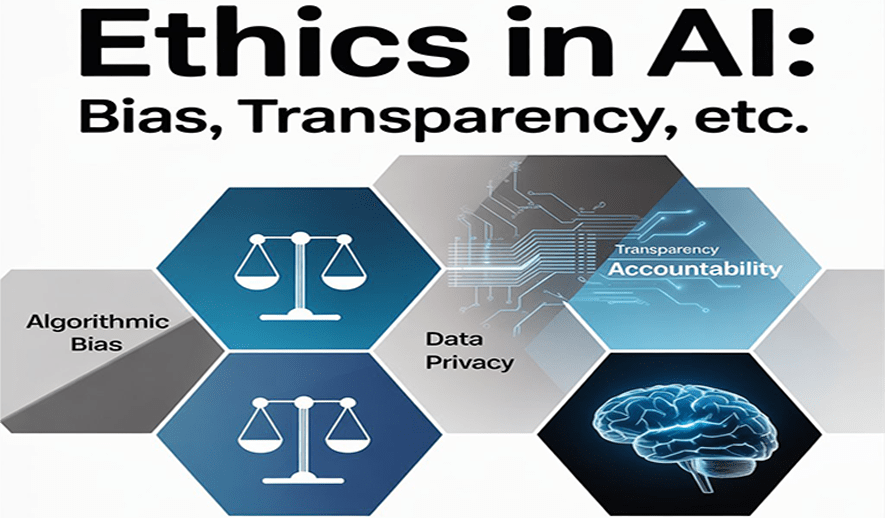
Ethics in AI: Bias, Transparency, etc.
Artificial intelligence (AI) ethics is a field of study focusing on the moral principles and values that guide the development, deployment, and use of AI technologies. Given the growing integration of AI into critical sectors like finance, healthcare, and criminal justice, addressing these ethical challenges is crucial for fostering trustworthy, fair, and responsible AI.
Core ethical issues in AI
Bias and fairness
AI systems can perpetuate and even amplify existing societal biases if not carefully managed.
-
Sources of bias: Bias can originate from several sources:
- Data bias: Training datasets that reflect historical inequalities or are not representative of the real world can lead to biased outcomes. For example, a facial recognition system primarily trained on light-skinned faces may have higher error rates for individuals with darker skin.
- Algorithmic bias: The design of the algorithm itself can inadvertently introduce or magnify biases. For instance, an algorithm that prioritizes certain features over others can result in discriminatory outcomes.
- Human decision bias: The subjective decisions made by humans during the data labeling and model development process can embed cognitive biases into the AI system.
- Consequences: Biased AI can lead to discriminatory practices in hiring, loan approvals, and law enforcement, reinforcing societal inequalities and undermining public trust.
- Mitigation strategies: Efforts to mitigate bias include:
- Using diverse and representative data.
- Conducting regular audits of AI systems to detect and correct biases.
- Developing fairness-aware algorithms.
- Implementing a "human-in-the-loop" approach, where human oversight is incorporated into the decision-making process.
Transparency and explainability
Transparency refers to disclosing details about an AI's operation, while explainability focuses on providing understandable reasons for specific AI decisions.
- The "black box" problem: Many advanced AI models, particularly deep learning systems, are considered "black boxes" because their complex decision-making processes are difficult for humans to interpret. This lack of transparency can hinder trust and make it difficult to identify and correct issues.
- In high-stakes industries: In domains like finance and medicine, where AI decisions can have significant consequences, the ability to understand why a decision was made is critical for ensuring fairness, compliance, and accountability.
-
Techniques for transparency: Approaches include:
- Explainable AI (XAI): Methods and tools that provide explanations for AI outputs, such as SHAP and LIME.
- Model documentation: Detailed records of the model's design, data sources, and evaluation process help improve transparency.
Accountability and responsibility
Determining who is responsible when an AI system causes harm is a complex ethical and legal issue.
- Distributed accountability: AI systems often involve multiple stakeholders—including developers, data providers, and end-users—which can blur the lines of responsibility.
- Autonomous decisions: As AI systems become more autonomous, they can make independent decisions, complicating the assignment of blame when errors occur.
- Accountability frameworks: Establishing clear governance frameworks that define roles and responsibilities throughout the AI lifecycle is essential. This includes oversight, impact assessments, and audit mechanisms.
Other important ethical considerations
- Privacy: AI systems often require access to vast amounts of data, raising concerns about privacy and data security. Techniques like differential privacy and federated learning are used to protect sensitive information.
- Human oversight: The principle of keeping a human "in the loop" ensures that AI systems do not displace ultimate human responsibility, particularly in critical applications where human judgment is indispensable.
- Sustainability: The computational resources required to train and run large AI models can have a significant environmental impact. Ethical AI prioritizes sustainable practices to minimize the carbon footprint.
- Social impact: AI can have profound effects on society, from potential job displacement and wealth inequality to the amplification of misinformation. Ethical AI development considers these long-term consequences to ensure the technology benefits all of society.
